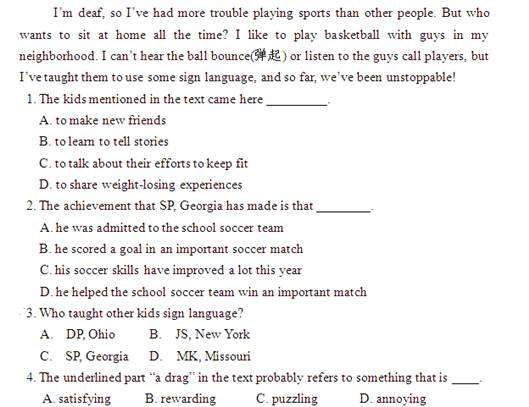-
I’d like to share a little story with you about something that happened when I was four. I remember it clearly. Our loving family dog was nearing the end of his life. My father picked him up and put him in a little bed we had made for him. Our dog, my companion, whom we had cared for, bit my father when he attempted to help him. How could he? Why? I couldn’t understand it. I didn’t like him anymore.
I hadn’t thought about that story for a long time but something that happened last week brought it back to me. I went to speak with a friend. When I knocked on the door, I met in an instant an angry look and a few harsh(尖刻的)words. When the door was slammed(砰地关上)in my face, I stood there shocked, and in a rush, I was reminded of my dog bit my father 20 years ago or so. What brought that story back was that same feeling of betrayal.
Both stories taught me something the next day. You see, when I got up in the morning and was told my dog had died, it became clear to me that he must have been in great pain. For him to have bitten a family member, he could not have been himself. Much the same for the other story when I learned that my friend’s wife had just left him.
We are all beings of our environments, our opinions and feelings. And all of those things can cause you to say and do things that can’t be understood by those who are not in the same situation with you.
If you meet someone either behaving out of character or acting in a way that doesn’t seem to fit the situation, put out your hand and be patient when you think it is least possible for him to do so. You may turn around a story that has a sad ending simply by your actions.
1.The incident that happened when the author was four______.
A. hurt the author’s feeling deeply
B. has puzzled the author ever since
C. left a deep impression on the author
D. made the author dislike dogs
2.What made the author think about the story of about 20 years ago?
A. His friend’s attitude.
B. The photo of the dog.
C. His father’s wound.
D. His friend’s suffering.
3.The author's friend said harsh words to the author because______.
A. he was bad-tempered
B. he was suffering the pain of losing his wife
C. he was bothered by an unexpected visit
D. they once quarreled and he couldn’t forgive the author
4.What conclusion did the author get from the two stories?
A. Misunderstanding should be removed in time.
B. Sometimes one will be hurt without any reason.
C. Many people think more of themselves and less of others.
D. Many factors will affect one’s behavior.
5.What’s the author’s advice to us?
A. Help those in need.
B. Look before you leap.
C. Learn to understand others.
D. Tolerance is a kind of virtue.
高三英语阅读理解中等难度题查看答案及解析
-
I’d like to share a little story with you about something that happened when I was four. I remember it clearly. Our loving family dog was nearing the end of his life. My father picked him up and put him in a little bed we had made for him. Our dog, my companion, whom we had cared for, bit my father when he attempted to help him. How could he? Why? I couldn’t understand it. I didn’t like him anymore.
I hadn’t thought about that story for a long time but something that happened last week brought it back to me. I went to speak with a friend. When I knocked on the door, I met in an instant an angry look and a few harsh(尖刻的)words. When the door was slammed(砰地关上)in my face, I stood there shocked, and in a rush, I was reminded of my dog bit my father 20 years ago or so. What brought that story back was that same feeling of betrayal.
Both stories taught me something the next day. You see, when I got up in the morning and was told my dog had died, it became clear to me that he must have been in great pain. For him to have bitten a family member, he could not have been himself. Much the same for the other story when I learned that my friend’s wife had just left him.
We are all beings of our environments, our opinions and feelings. And all of those things can cause you to say and do things that can’t be understood by those who are not in the same situation with you.
If you meet someone either behaving out of character or acting in a way that doesn’t seem to fit the situation, put out your hand and be patient when you think it is least possible for him to do so. You may turn around a story that has a sad ending simply by your actions.
1.What is the influence of the incident mentioned in Paragraph 1?
A. It hurt his father’s feeling deeply.
B. It has puzzled the author ever since.
C. It left a deep impression on the author.
D. It made the author dislike dogs.
2.What made the author think of the story of about 20 years ago?
A. His friend’s attitude.
B. The photo of the dog.
C. His father’s wound.
D. His friend’s suffering.
3.Why did the author’s friend say harsh words to the author?
A. He was ill-tempered.
B. He was suffering the pain of losing his wife.
C. He was bothered by an unexpected visit.
D. They once quarreled and he couldn’t forgive the author.
4.What’s the author’s advice to us?
A. Help those in need.
B. Look before you leap.
C. Respect for others is a kind of virtue.
D. Learn to put yourself in others’ shoes.
高三英语阅读理解中等难度题查看答案及解析
-
I’d like to share a little story with you about something that happened when I was four. I remember it clearly. Our loving family dog was nearing the end of his life. My father picked him up and put him in a little bed we had made for him. Our dog, my companion, whom we had cared for, bit my father when he attempted to help him. How could he? Why? I couldn’t understand it. I didn’t like him anymore.
I hadn’t thought about that story for a long time but something that happened last week brought it back to me. I went to speak with a friend. When I knocked on the door, I met in an instant an angry look and a few harsh(尖刻的)words. When the door was slammed(砰地关上)in my face, I stood there shocked, and in a rush, I was reminded of my dog bit my father 20 years ago or so. What brought that story back was that same feeling of betrayal.
Both stories taught me something the next day. You see, when I got up in the morning and was told my dog had died, it became clear to me that he must have been in great pain. For him to have bitten a family member, he could not have been himself. Much the same for the other story when I learned that my friend’s wife had just left him.
We are all beings of our environments, our opinions and feelings. And all of those things can cause you to say and do things that can’t be understood by those who are not in the same situation with you.
If you meet someone either behaving out of character or acting in a way that doesn’t seem to fit the situation, put out your hand and be patient when you think it is least possible for him to do so. You may turn around a story that has a sad ending simply by your actions.
1.What is the influence of the incident mentioned in Paragraph 1?
A. It hurt his father’s feeling deeply. B. It has puzzled the author ever since.
C. It left a deep impression on the author. D. It made the author dislike dogs.
2.Why did the author’s friend say harsh words to the author?
A. He was ill-tempered.
B. He was suffering the pain of losing his wife.
C. He was bothered by an unexpected visit.
D. They once quarreled and he couldn’t forgive the author.
3.What’s the author’s advice to us?
A. Help those in need. B. Look before you leap.
C. Respect for others is a kind of virtue. D. Learn to put yourself in others’ shoes.
高三英语阅读理解中等难度题查看答案及解析
-
We started in 1993 with a simple idea: that people could help each other by sharing stories about their lives. For years people had told our founders, motivational speakers Jack and Mark, inspiring stories about themselves. Jack and Mark included these stories in their talks, and their audiences repeatedly asked if they had ever been published.” That story about the boy and the puppy—is that in a book anywhere?” a parent asked Jack. “That story about the boy with the amputated(截肢)leg who became a tennis star, I need to read that to my staff,” a manager told him. Jack was asked repeatedly, “ Is that story in a book anywhere?”
Eventually Jack and Mark decided their audiences must be on to something, so they collected the best 101 stories they’d been told in a book. They called it Chicken Soup for the Soul because they wanted it to provide comfort just like their grandmother’s cooking.
They took the book to New York, hoping to sell it to one of the big publishers but every single one turned them down. The project appeared to have stalled until they met Peter Vegso, the owner of a small health and wellness polisher in Florida named HCI. Peter read some of the stories and loved them, so he decided to give the book a chance, becoming Chicken Soup for the Soul’s founding publisher.
Never, in Jack and Mark’s wildest dreams had they imagined what the book would become. Chicken Soup for the Soul turned into one of the most popular and loved books ever published, selling 11 million copies around the world. Readers asked for more stories so we published a “second helping” of Chicken Soup for the Soul and a third after that, Today, we’ve published more than 250 books, which have become the best-selling trade paperback book series of all time.
1.What droved Jack and Mark to publish these inspiring stores?
A. The rich source of good stories.
B. The good chance to be famous.
C. The benefits from the book.
D. The demand of audience
2.How did the title of the book come from?
A. The taste of chicken.
B. The way of cooking
C. The purpose of the book.
D. The experiences of children.
3.Which of the following can replace the underlined word “stalled” in Paragraph 3?
A. Stopped.
B. Failed.
C. Succeeded.
D. Progressed.
4.What do we know from the last paragraph?
A. The wildest dreams of two people.
B. An unexpected success of a book
C. An introduction to a series of books.
D. Calling on people to buy a best seller.
高三英语阅读理解中等难度题查看答案及解析
-
This is the place for you to come to share stories with other real kids who are trying hard to improve their bodies and minds! Did you score a goal in your soccer game? Have you got rid of a bad habit? Are you working to reduce your stress in life? Tell the world what makes your body and mind healthy!
Posted by Dp, Ohio
I have been working on a fitness equipment to exercise for over four months. I have completed my goal of losing weight and I am very proud of myself. That is so cool!
Posted by MK, Missouri
I was always tired at school, because I used to stay up late watching TV. I even fell asleep one day in my history class, and when I woke up, the teacher was looking at me and laughing! I decided that minute to start going to bed on time. It’s kind of a drag missing the shows I like, but I can tell my body loves it – I feel so much better!
Posted by SP, Georgia
Last year, I didn’t make the soccer team at school. I didn’t want to try out again this year, but a few weeks before tryouts(选拔赛), I started kicking the ball around and practicing. When tryout day came, I decided to give it another shot. Guess what? I made the team!
Posted by JS, New York
I’m deaf, so I’ve had more trouble playing sports than other people. But who wants to sit at home all the time? I like to play basketball with guys in my neighborhood. I can’t hear the ball bounce(弹起) or listen to the guys call plays, but I’ve taught them to use some sign language, and so far, we’ve been unstoppable!
1. The kids mentioned in the text came here _________.
A. to make new friends
B. to learn to tell stories
C. to talk about their efforts to keep fit
D. to share weight-losing experiences
2. The achievement that SP, Georgia has made is that ________.
A. he was admitted to the school soccer team
B. he scored a goal in an important soccer match
C. his soccer skills have improved a lot this year
D. he helped the school soccer team win an important match
3.Who taught other kids sign language?
A. DP, Ohio B. JS, New York
C. SP, Georgia D. MK, Missouri
4. The underlined part “a drag” in the text probably refers to something that is ____.
A. satisfying B. rewarding C. puzzling D. annoying
高三英语阅读理解中等难度题查看答案及解析
-
This is the place for you to come to share stories with other real kids who are trying hard to improve their bodies and minds! Did you score a goal in your soccer game? Have you got rid of a bad habit? Are you working to reduce your stress in life? Tell the world what makes your body and mind healthy!
Posted by Dp, Ohio
I have been working on a fitness equipment to exercise for over four months. I have completed my goal of losing weight and I am very proud of myself. That is so cool!
Posted by MK, Missouri
I was always tired at school, because I used to stay up late watching TV. I even fell asleep one day in my history class, and when I woke up, the teacher was looking at me and laughing! I decided that minute to start going to bed on time. It’s kind of a drag missing the shows I like, but I can tell my body loves it – I feel so much better!
Posted by SP, Georgia
Last year, I didn’t make the soccer team at school. I didn’t want to try out again this year, but a few weeks before tryouts(选拔赛), I started kicking the ball around and practicing. When tryout day came, I decided to give it another shot. Guess what? I made the team!
Posted by JS, New York

高三英语阅读理解中等难度题查看答案及解析
-
阅读理解。
The stories we share with one another are important.They show wisdom and provide inspiration.They are important to our development.But sometimes people choose not to tell.
Considering the negative effects of not sharing a story in the news,people are wondering if public health officials are holding back too much information about the recent outbreak of Ebola.
There is a danger in holding back stories that ought to be told.Bobette Buster said it like this,“The fact is, history has shown us that stories not told can become like a dangerous genie (妖怪) left in a bottle.When they are finally uncorked,their power to destroy is set free.”
There are a number of reasons why we hide parts of our story:they often show our weaknesses or expose our disadvantages; they require courage and strength to share; and of course, there are some stories that should be kept secret—especially those that embarrass someone else.
Most of us have two selves:the one we display on the outside and the one we actually are on the inside.And the better we get at hiding the stories that show our true selves, the more damage we may be causing to ourselves and to others.
Honesty and openness is important:It proves we are trustworthy.It displays we are human.We are not perfect or better.It highlights the importance of hard work and personal development.Hard work may not allow us to overcome our disadvantages completely.But with hard work, we do not have to be restricted to our mistakes.
Does this mean we admit every weakness, every disadvantage, and every secret regret to everybody we meet? No, of course not.There is a time and a place and a certain level of relationship necessary for some stories to be told in an appropriate manner.
1.What's the function of the example in Paragraph 2?
A.It reflects that people are concerning about the spread of Ebola.
B.It shows the bad effect caused by sharing a story.
C.It proves not sharing a story can cause trouble.
D.It concludes that one should share a story at a proper time.
2.One of the reasons why people are unwilling to share experiences is that ________.
A.storysharing highlights the importance of hard work
B.people are used to exposing their weaknesses
C.people so metimes have no courage to share their stories
D.some stories make themselves feel uneasy
3.Which is close in meaning to the underlined word “uncorked” in Paragraph 3?
A.Freed. B.Broken.
C.Unfolded. D.Untouched.
4.The writer aims to convince us to ________.
A.be open to people close to you by sharing some secrets
B.share stories appropriately for the good of others and ourselves
C.remove the dangers that can be caused by untold stories
D.realize the importance of being honest when making
friends
高三英语阅读理解中等难度题查看答案及解析
-
—Is there anything else ______ that you’d like to share with us ?
—No, thank you.
A.in particular B.in order C.in short D.in conclusion
高三英语单项填空简单题查看答案及解析
-
Share with us!
Would you like to have your writing published in this magazine?
Then let us know! We pay for stories, anecdotes and jokes:
 Anecdotes and Jokes
Anecdotes and Jokes$50
What’s made you laugh recently? A funny sign? A colleague’s behaviour? Got a joke? Send it in for Laughter is the Best Medicine!
Email: Juliet@sws.com
 Smart Animals
Smart AnimalsUp to $100
Send us a tale about the strange behaviour of unique pets or wildlife in up to 300 words.
Email: audrey@sws.com
 Power of Love
Power of LoveUp to $150
Acts of generosity can change lives or just give you that warm feeling full of love. Share your moments in 100-500 words.
Email: susan@sws.com
 My Story
My Story$350
Do you have an inspiring or life-changing story to tell? Your story must be true, unpublished, original and 800-1000 words.
Email: nanjc@sws.com
For more information, please visit: http://www.sws.com./share
1.How much will the magazine pay for a joke to be published?
A. $50. B. $100. C. $150. D. $350.
2.If you want to share a story of your pets with the readers, you need to submit it to ________.
A. Anecdotes and Jokes B. Smart Animals
C. Power of Love D. My Story
3.A story showing people’s generosity should be emailed to the editor at ________.
A. juliet@sws.com B. susan@sws.com
C. Audrey@sws.com D. nanjc@sws.com
4.An inspiring story sent to the magazine should ________.
A. describe strange behaviour B. contain less than 800 words
C. be real and original D. be published before
高三英语阅读理解简单题查看答案及解析
-
Share with us!
Would you like to have your writing published in this magazine?
Then let us know! We pay for stories, anecdotes and jokes:
 Anecdotes and Jokes
Anecdotes and Jokes$50
What’s made you laugh recently? A funny sign? A colleague’s behaviour? Got a joke? Send it in for Laughter is the Best Medicine!
Email: Juliet@sws.com
 Smart Animals
Smart AnimalsUp to $100
Send us a tale about the strange behaviour of unique pets or wildlife in up to 300 words.
Email: audrey@sws.com
 Power of Love
Power of LoveUp to $150
Acts of generosity can change lives or just give you that warm feeling full of love. Share your moments in 100-500 words.
Email: susan@sws.com
 My Story
My Story$350
Do you have an inspiring or life-changing story to tell? Your story must be true, unpublished, original and 800-1000 words.
Email: nanjc@sws.com
For more information, please visit: http://www.sws.com./share
1.How much will the magazine pay for a joke to be published?
A.$50. B.$100. C.$150. D.$350.
2.If you want to share a story of your pets with the readers, you need to submit it to ________.
A.Anecdotes and Jokes B.Smart Animals
C.Power of Love D.My Story
3.A story showing people’s generosity should be emailed to the editor at ________.
A.juliet@sws.com B.susan@sws.com
C.Audrey@sws.com D.nanjc@sws.com
4.An inspiring story sent to the magazine should ________.
A.describe strange behaviour B.contain less than 800 words
C.be real and original D.be published before
高三英语阅读理解中等难度题查看答案及解析